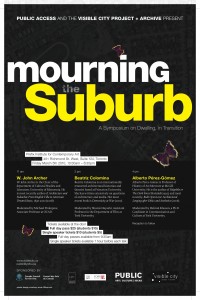 Presented by Public Access and the Visible City Project + Archive
Presented by Public Access and the Visible City Project + Archive
Prefix Institute for Contemporary Art
401 Richmond St. West, Suite 124
Toronto
Friday March 5th 2010
10:30am – 6:30pm
Mourning Suburbs: Art and Development
As complement to the Leona Drive Project (http://leonadrive.info.yorku.ca/) and in response to the reception, both critical and popular, of its suburban problematic, this symposium asks quite simply: how do we—how have we come to, why do we even want to—know ‘the suburb’? And why does it appear that, just as it has begun to wane as an historical form, the suburb has become a privileged object of knowledge, circulating at such a speed within a variety of discourses.
Rather than pose these queries of suburban knowledge under the traditional rubric of an academic symposium—considering that ‘the rubric’ derives, quite materially, from red clay, from the ground—we instead seek to orient ourselves according to the mood of Leona Drive itself. Where a series of post-WWII homes sit vacant, awaiting their development/destruction; a space simultaneously nostalgic and anxious, essentially on hold. Thus, we invite our participants to think about the suburb within the scenario of the wake. To enter a period of mourning for that, precisely, which is in the process of passing: the suburban as an integral whole, as a paradigmatic form of dwelling which, as the breath which flees the organs, may not survive passage into the register of objective knowledge. Here, at home (however temporarily) within the interim, we wish to dwell upon the historical transition of dwelling—as the productive techno-social relation between subjects and space—in an attempt to recognize our relationship, both real and imaginary, to the suburban legacy.
On Dwelling:
How have we come to know, to dwell upon, to mythologize the suburb? And how has this epistemic legacy affected our ability to recognize the suburban reality of today? If the contemporary suburb offers us knowledge, what is its specificity, its ideology, its surplus, its promise?
Building, Ruin:
The suburb as historical vision, dream, plan—and future ruin. What have been the conditions of possibility for the suburban form and, given the present, does it have a future? Must, and can, we re-imagine the suburbs? If we are in transition towards another form of dwelling, what shall its contours be? How may we recognize it?
The Suburban Spirit:
If the suburban form wanes, anticipating either its renewal or end, might we, in transition, catch sight of its spirit? That which animates it, on the level of the everyday? The suburban experience? Might artistic practices here provide us with unique forms of representation? If so, how has this suburban spirit reached expression within the aesthetic register?
11 am
W. John Archer
W. John Archer is the Chair of the department of Cultural Studies and Literature at the University of Minnesota. Anchored in architectural history and theory, his interests range from the critique of present-day suburbia to the analysis of historical practices in colonial cities of South Asia. He is most recently author of Architecture and Suburbia: From English Villa to American Dream House, 1690-2000 (2008).
Moderated by Michael Prokopow, Associate Professor at OCAD.
2pm
Beatriz Colomina
Beatriz Colomina is an internationally renowned architectural historian and theorist based at Princeton University. She has written extensively on questions of architecture and media. Her books include Privacy and Publicity: Modern Architecture as Mass Media (1994), Sexuality and Space (1992), and most recently Domesticity at War (2007).
Moderated by Sharon Hayashi, Assistant Professor of Cinema and Media Studies in the Department of Film at York University.
4pm
Alberto Pérez-Gómez
Alberto Pérez-Gómez is Professor of History of Architecture at McGill University. He is the author of Polyphilo or The Dark Forest Revisited (1992), co-author of Architectural Representation and the Perspective Hinge (1997) as well as, most recently, Built Upon Love: Architectural Longing after Ethics and Aesthetics (2006).
Moderated by Helmut Klassen, PhD Candidate in Communication and Culture at York University.
Reception to follow
Full day pass $25 (Students $15)
Single speaker tickets $10 (Students $5)
Tickets available at the door: full-day passes available from 9:30am / single speaker tickets available 1 hour before each talk.
www.visiblecity.ca
public@yorku.ca

